Ninety-five percent of search traffic goes to the first page of search results—if brands want to be seen, they have to show up. But it’s a long slog optimizing every page, and it can take time to rank from organic SEO tactics, which is where Google ads come into play.
Google ads (also known as PPC ads) target relevant keywords and push merchants up search engine results pages. The ad options today include Google Shopping, Display Ads, remarketing campaigns, and other features that brands can use to attract new shoppers and increase awareness.
There’s a lot of talk about consumers getting tired of ads and implementing ad blockers, but those that do still seek out ads are more likely to buy. In fact, people who click on ads are 50% more likely to make a purchase. To get those clicks, you have to stand out.
Here are some Google ad examples of brands getting it right in the search results.
1. Arckit
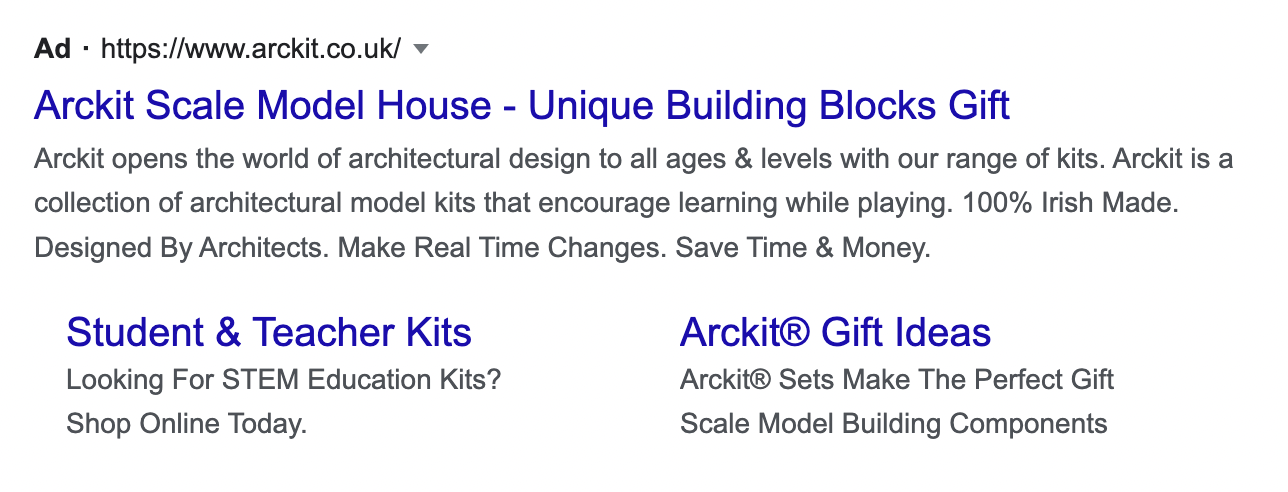 Arckit sells building blocks for kids and teachers, and uses text ads to target popular keywords like “kids toys” and “kids building blocks” to hit the top of the search engine results.
Arckit sells building blocks for kids and teachers, and uses text ads to target popular keywords like “kids toys” and “kids building blocks” to hit the top of the search engine results.
Why it works:
- Takes up prime real estate. Arckit uses extra links and a multiline format to ensure its ad takes up more space in the search results, drawing attention and clicks.
- Targeted options. Instead of providing a one-size-fits-all link, Arckit provides a small menu for consumers to choose from based on their purchase intent. For example, if they’re a teacher looking for STEM kits, they can go directly to the relevant landing pages, or if they’re looking for gifts for their children, they can navigate somewhere else.
2. Faire
Faire is a one-stop wholesale shop that sells everything from home décor to jewelry to body lotions. It has a lot of different product categories to promote, so it uses Google Ads to target specific keyword sets and drive click-through rates (CTR). In this instance, its ad shows up for the term “decoupage paper.”
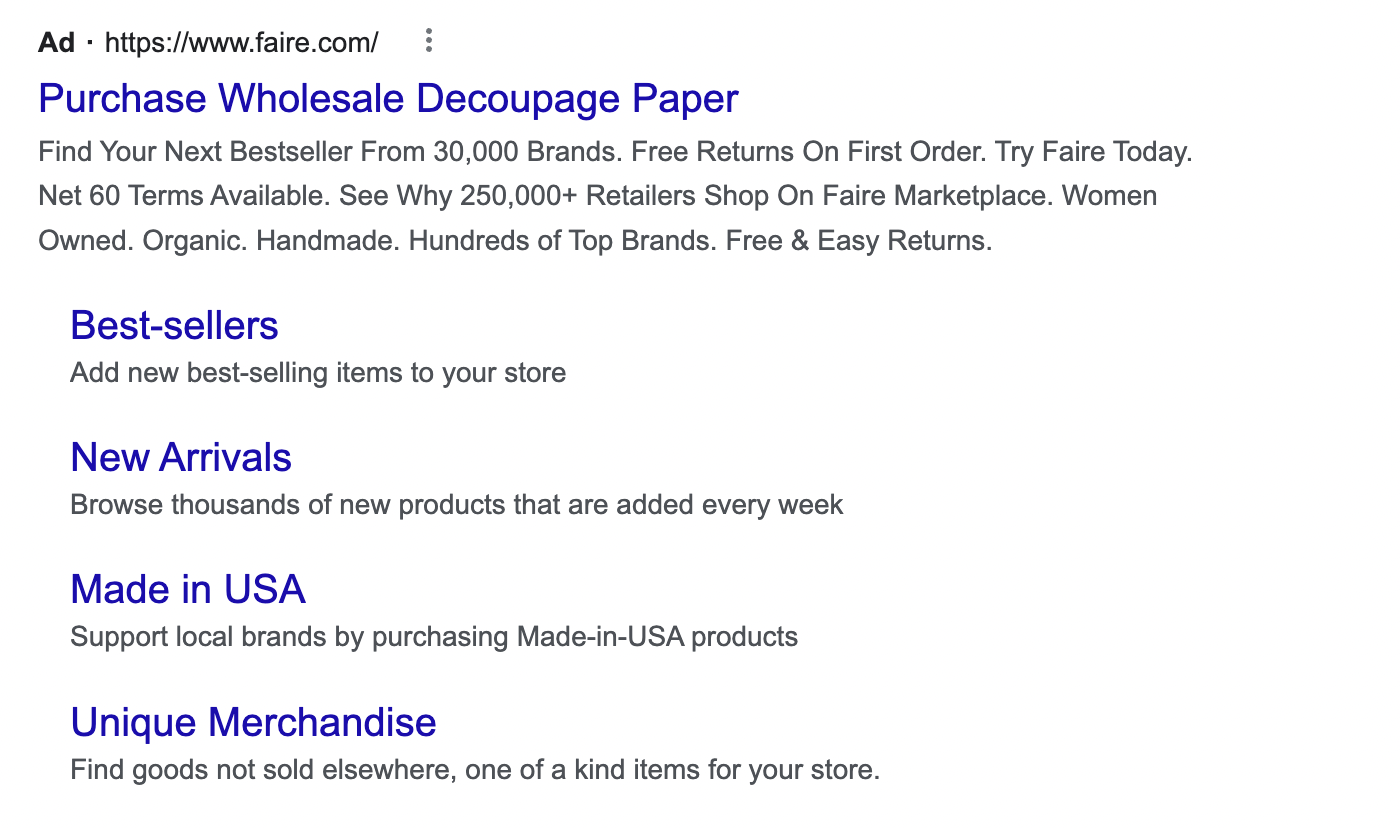
Why it works:
- Mentions returns. Lots of shoppers are concerned about returning goods bought online, since they aren’t able to see or feel the product before they purchase. Mentioning this in the ad builds trust and tackles a key objective many consumers have.
- States a unique selling proposition. There are plenty of brands that sell decoupage paper out there, but Faire stands out by highlighting what makes it different—that it’s women-owned and uses only organic, handmade products and materials.
- Promotes different product lines. Shoppers may well be looking for decoupage paper, but the links to the brand’s bestsellers and new arrivals open up new product categories for consumers to explore.
3. Boden
Well-known clothing brand Boden taps into the Google Shopping ads feature to promote products in a visual way. The competition is fierce in this part of the search results, so it’s important that the brand creates ads that stand out. 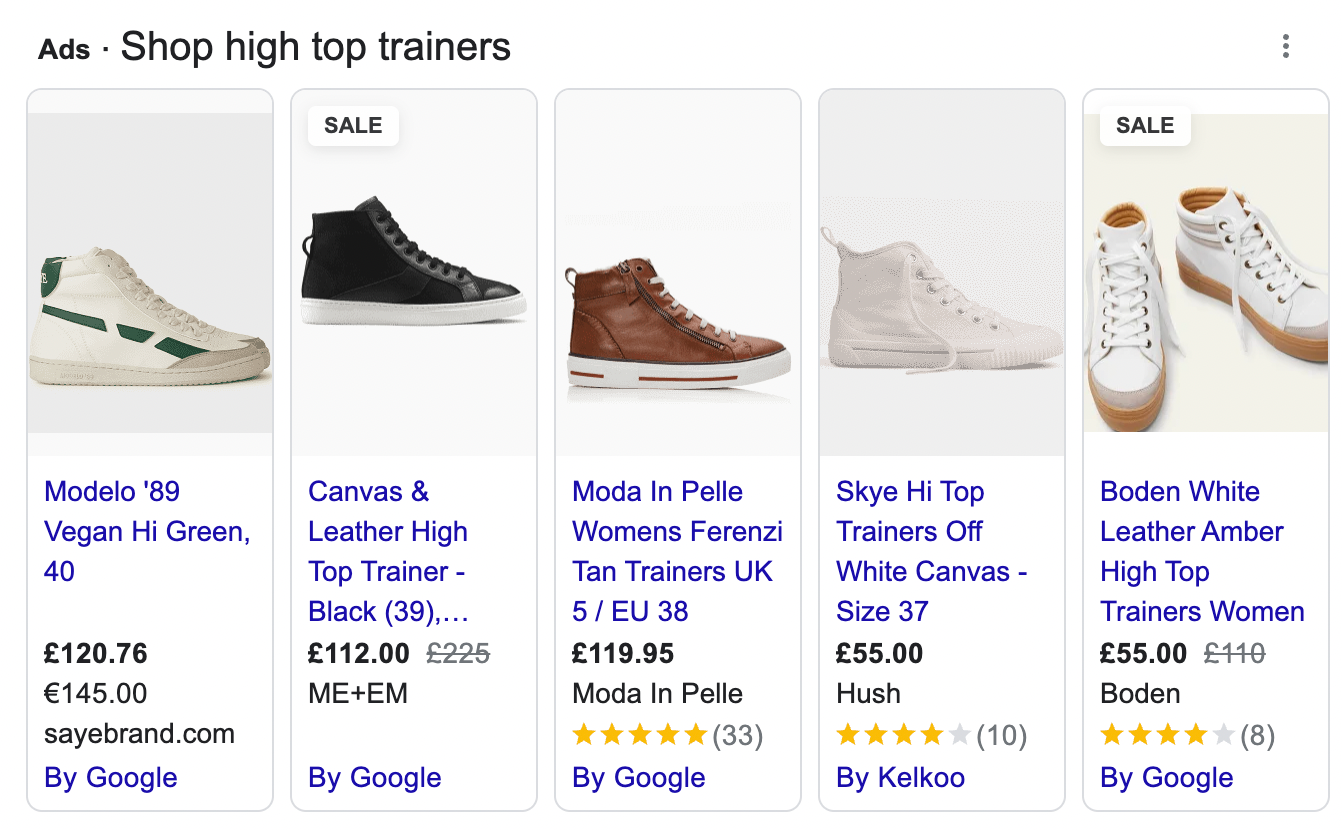 Why it works:
Why it works:
- Shows a discount. Everyone loves a good deal, and Boden displays its discounts directly in the ads so shoppers can see how much they’re saving.
- Unique imagery. Compared to the other results in the search, Boden’s ad stands out because it shows the product in a different way and from a unique perspective.
- Includes star ratings. Reviews are a key driver in the buying process. Including them here alongside the number of reviews gives the brand an edge over competitors (plus the visual nature of the stars help the ad stand out further).
💡Pro tip: Reach shoppers at just the right moment with Performance Max campaigns. The feature lets you create ads that are designed to target shoppers when they’re searching for products just like yours on Google.
4. Moonpig
Moonpig is renowned for its huge range of personalized greetings cards and gifts that shoppers can send directly from the site. This ad targets the keyword “personalized cards,” which is highly relevant to the products Moonpig sells.  Why it works:
Why it works:
- Promotes one compelling benefit. Same day posting is a huge advantage for shoppers who are time-crunched or who have left their gift-giving until the last minute. Moonpig leads with this unique selling proposition to target a pain point its customers might have.
- Provides shoppers with options. There are multiple links for searchers to explore, depending on the context of their search or their end goal.
- Uses clear calls to action. The brand incorporates action words (like “send” and “get”) as part of its CTAs to drive click-throughs
5. Argos
UK brand Argos sells a bit of everything, including power drills, furniture, plants, and DIY accessories. It uses Google Shopping to promote its wide range of products, targeting specific keywords to capture shoppers with an intent to buy. 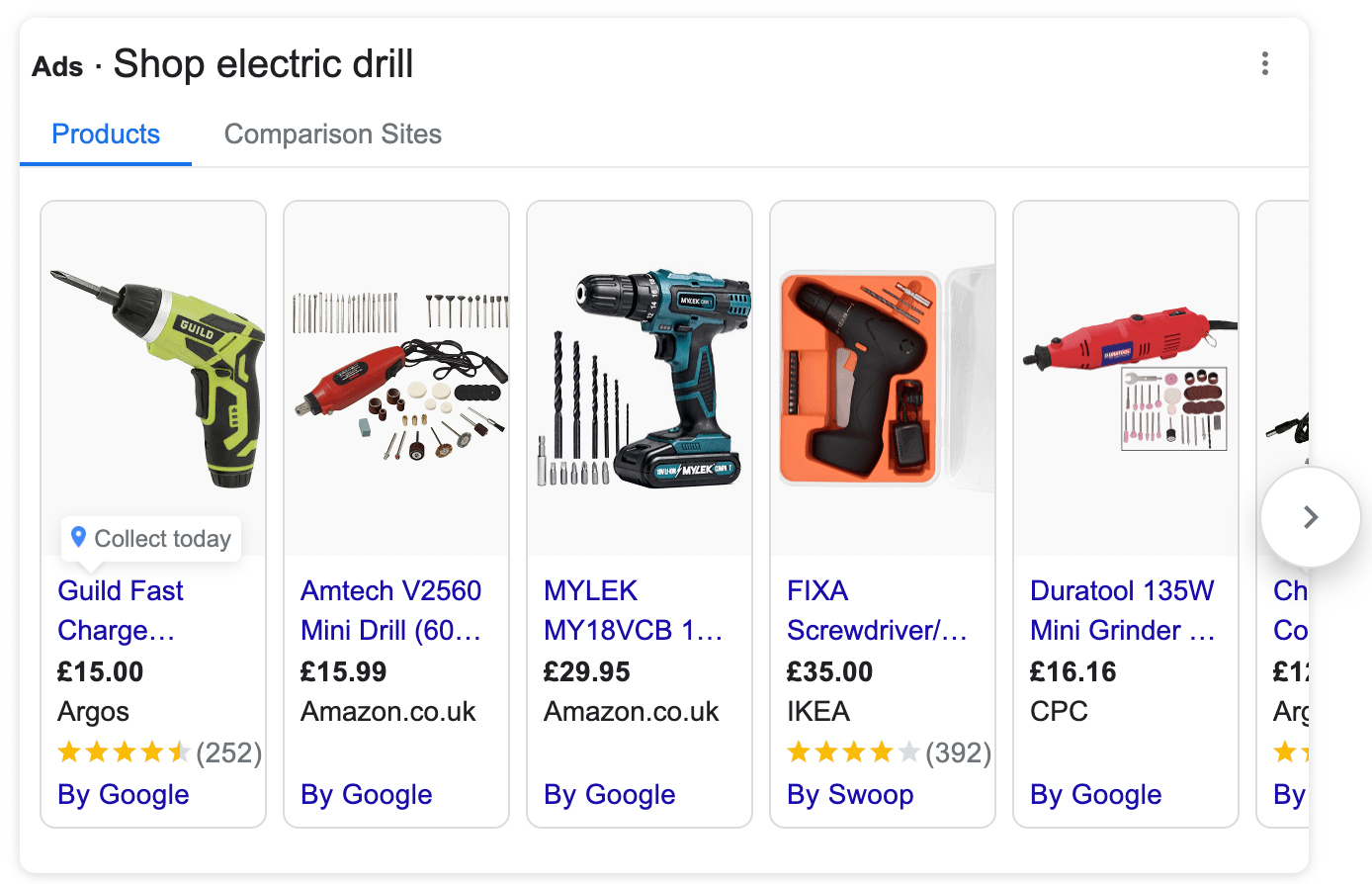
Why it works:
- Includes star ratings. The almost-full star rating instills trust and credibility in the brand—especially for shoppers who might not have bought from it before.
- Offers same-day collection. Argos bridges the online and offline world with its ads by highlighting its “collect today” service, which means customers can have their chosen product in their hands in a matter of hours. This ad is very compelling for consumers who are in dire need of a drill ASAP.
6. Office Furniture Online
Office Furniture Online sells exactly as it says on the tin. The ads boost it up the search results with the aim of attracting online shoppers to buy offline. Why it works:
Why it works:
- Combines online and offline efforts. The inclusion of the phone number through one of Google’s call extensions means shoppers can bridge the gap between online and offline if they want to.
- Includes star rating. Incorporating the star rating and large number of reviews ensures the ad stands out among other text-based results and instills credibility.
- Mentions delivery. A lot of shoppers are concerned about delivery, which makes the quick reference to free next-day delivery a major selling point.
- Targets additional keywords. The links at the bottom of the ad target highly focused keywords and search terms related to the brand’s product lines.
7. Neon Pop
Neon Pop sells lighting and signs for all occasions. This ad shows up in Google search results for “neon sign” and, like the Office Furniture Online ad, bridges the gap between online and offline sales. Why it works:
Why it works:
- Includes a phone number. Not only does adding a phone number cater to the needs of shoppers who would rather buy offline, but it provides credibility by showing that the brand is real.
- Offers multiple payment options. Like delivery and returns, lots of shoppers have a preferred way to pay. By promoting that it has a variety of payment options, Neon Pop can attract a wider audience.
- Provides alternative options. If shoppers aren’t quite ready to buy, the ad directs them to other features, including a place where they can create their own design.
8. Flashbay
Flashbay sells a whole host of electronics, gadgets, and accessories, giving it a wide range of product categories to promote and plenty of competition from other brands. It uses a Google Ads campaign to direct shoppers to specific products—for example, here the brand is targeting the phrase “reusable water bottle.” Why it works:
Why it works:
- Uses a review as the ad. Unlike the other ads listed here, Flashbay actually incorporates a customer review into the ad for social proof and added credibility.
- Includes a star rating. Again, the brand attaches a five-star rating to the ad along with the number of reviews potential customers can browse through for even more social proof.
9. Glossier
Well-known beauty brand Glossier runs different ads for different occasions. In the screenshot below, it uses one of the promotion’s ad extensions to highlight its new products.
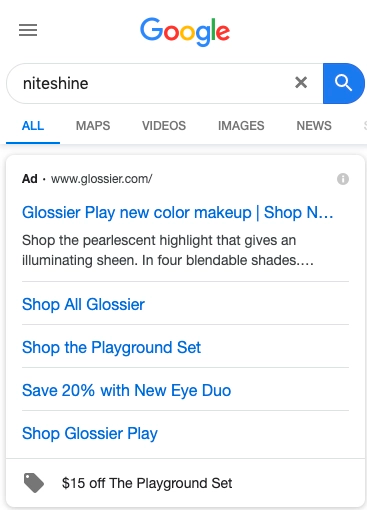
In the following ad, it’s announcing its launch in a new market: 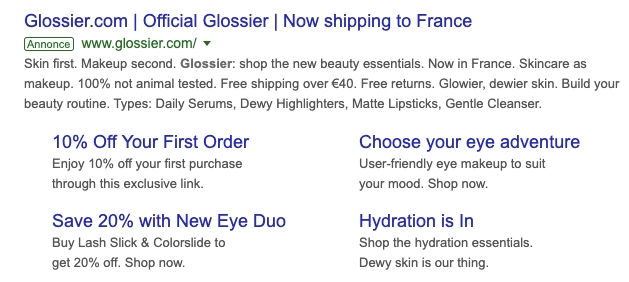 Why it works:
Why it works:
- Provides a percentage-off discount. The ad for the new product offers the added incentive of money off if shoppers make a purchase.
- Promotes different product lines. Despite targeting keywords for a specific product, the ad highlights other categories to give customers choice and expose them to new products.
- Personalizes the experience. Encourages searchers to “choose their eye adventure,” which creates a human connection and personalizes the shopping experience.
10. MVMT
MVMT is a well-known DTC watch brand. It uses Google ads to promote specific products as well as share discounts during key events. This ad, for example, is celebrating the brand’s anniversary and offering customers a percentage off their purchases as part of the event. 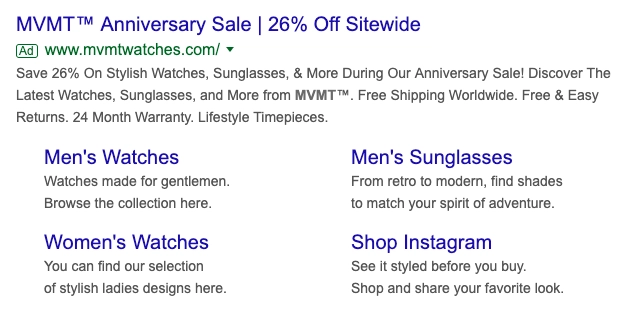
Why it works:
- Specialist ad for specific event. Promoting a specific event with an added incentive creates a sense of urgency.
- Promotes UGC on Instagram. As a luxury product, MVMT knows most users will want to see their product in every possible angle before hitting that Buy button. That’s why it was smart of the brand to provide a link to its Instagram account where users can scroll through user generated content before purchasing in-app.
11. Tails
Tailor-made dog food brand Tails targets shoppers who are looking for specific dog food items and draws them in with a huge discount on their first order.  Why it works:
Why it works:
- Discount for first-time shoppers. Adding a 75% discount to the ad headline means it’s the first thing shoppers see and provides an irresistible incentive
- Mentions reviews and star ratings. Linking out the more than 30,000 reviews shows that there have been a lot of previous happy customers, which provides social proof and added credibility
- Personalized navigation options. As well as offering shoppers money off, the ad also gives them the opportunity to personalize their shopping experience by finding food tailored specifically to their dog’s needs.
12. The Beauty Worx
Hair care brand The Beauty Worx targets a specific audience with its Google search ads, calling them out in the ad headline and reiterating it with the products and links provided. 
Why it works:
- Mentions secure checkout and shipping. The Beauty Worx tackles potential objections by highlighting its secure checkout, free shipping, and easy returns, giving shoppers peace of mind.
- Targets different markets. The additional links in the ad target niche markets and focused target audience segments so customers can unlock an even more relevant experience.
Show up and stand out in the search results
Using Google ads helps you show up in search results, drive traffic to your site, increase brand awareness, and target customers based on the keywords you use. But it’s not enough to throw up a link and hope for the best—if you want any chance of standing out and improving your digital marketing efforts, your ads should reflect the needs of shoppers.
Take inspiration from these ecommerce brands that have leveled up their ad copy and headlines to make them more attractive. Try adding reviews, providing customers with a personalized experience, offering options based on each individual’s shopping intent, serving discounts, and allowing people to browse your entire product collection to decrease your cost-per-click and ad spend, drive traffic, and increase conversions.
Read more
- The 13 Most Powerful Shopify Discount Apps To Use
- What Is Performance Marketing? A Comprehensive Guide
- How to Create a Referral Marketing Strategy [+Definition
- Faster Checkout on Instagram and Facebook with Shop Pay
- What is Account-Based Marketing (ABM)? Definition and Guide
- Marketing Objectives- How to Set Good Marketing Objectives
- Customer Segments to Build to Drive Revenue
- Guide to Small Business Marketing- 10 SMB Marketing Tips and Strategies
- What Is Multichannel Selling? [Key Benefits + Tips to Start]
- TikTok for Ecommerce: How To Sell on TikTok
Google ads examples FAQ
What are effective Google ad examples?
Effective Google ads utilize clear calls-to-action and relevant keywords to attract clicks. For example, ads that feature promotional offers or local services can capture user attention more effectively and improve conversion rates.
What types of ads are available in Google Ads?
- Search ads
- Display ads
- Video ads on YouTube
- Remarketing ads
- Google app campaigns
How do I write a Google ad?
- Use relevant keywords
- Pick the right audience for your ad
- Be clear and concise
- Include a call-to-action
Which type of Google Ads is most effective?
The right type of ad depends on the audience you’re targeting. For example, Google Shopping ads work well for retailers, since you can target searchers looking for products like yours. A video ad might be more effective if you’re advertising visual media since it offers a “preview” of what the media entails.





